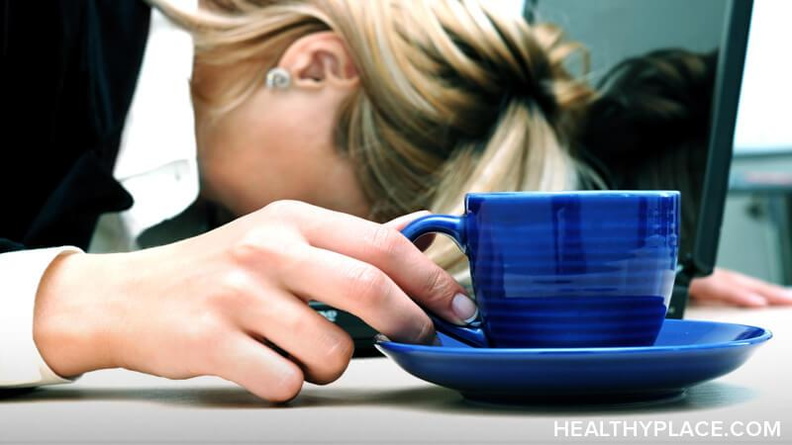Dealing with Fatigue at Work When You Have Depression

Fatigue at work often interferes with your job when you have depression. When you are constantly exhausted, it’s hard to focus on your job, and depending on what you do, this can be dangerous. If fatigue because of depression at work is a problem for you, it’s important to take steps to manage it. In this post, I will go over habits to establish to help you manage exhaustion, as well as some quick tips for dealing with fatigue at work.
Tips to Deal with Fatigue at Work Over Time
You can't deal with fatigue at work only when you're on the job. These tips will help you manage fatigue as part of ongoing self-care.
Fuel Your Body to Prevent Fatigue at Work
When I’m depressed, all I want to eat macaroni and cheese, but this only makes me feel like curling up and never leaving the couch again. Fatigue makes it difficult to put effort into anything, but it’s worth it to fuel your body with food that will give it more energy (Can an Apple a Day Keep Depression Away?).
Prioritize eating a balance of protein, complex carbohydrates, and healthy fats. Avoid processed foods with lots of sugar and simple carbohydrates, like pastries, which might boost you up for 30 minutes before ending in a nasty sugar crash. I find it helps to think to myself, “Is this ultimately going to make me feel better or worse?” before I eat anything when I’m depressed.
Pro tip: keep some almonds in your desk for a quick, convenient energy boost.
Practice Good Sleep Hygiene to Avoid Fatigue at Work
Whether or not you will get a good night’s sleep isn’t determined the moment you crawl under the sheets—it starts with the choices you make during the day. Make sure to keep a regular schedule--going to bed at the same time will train you to get sleepy when it’s time to sleep. In addition, avoid screens for an hour before bed as the blue light from your screen disrupts your natural sleep-wake cycle. I like to plug my phone in away from me and use an eye mask to keep all light out when I’m trying to sleep. Finally, avoid caffeine after 2 p.m. because it stays in your system for at least eight hours after you consume it (What Does Good Sleep Hygiene Mean?).
Exercise
When you’re profoundly tired, exercise might seem laughable, but exercising actually gives you more energy. The key is to put a regular exercise routine in place to maximize its benefits. Many people find that working out before work gives them a boost that helps them cruise through the day, while others like to use their lunch break to lift them up. You could also work out afterward for stress relief, though be mindful that working out too close to bedtime will disrupt your sleep. Make sure to stop exercising at least two hours before you hit the hay.
Talk to Your Doctor
If you are experiencing major fatigue at work, you may want to talk to your doctor. Fatigue is a common symptom of many different health conditions and it’s important that you’re getting proper treatment. Don’t assume your fatigue at work is because of your depression, and even if it is, your doctor will have suggestions for dealing with it based on your individual needs.
Quick Fix Tips to Manage Fatigue at Work
Looking for a quick solution for managing fatigue at work? While the most effective interventions are like the ones above that require ongoing management, here are some quick ways to address your fatigue when you’re at work:
- Take a walk
- Have a small, healthy snack
- Meditate
- Drink cold water
- Get up and stretch
- Chat with a friend
- Get outside for a few minutes
- Sniff some peppermint essential oil
- Do 10 jumping jacks
Have any good tips for dealing with fatigue at work? Let me know in the comments below.
APA Reference
Boyles, V.
(2018, April 17). Dealing with Fatigue at Work When You Have Depression, HealthyPlace. Retrieved
on 2026, March 4 from https://www.healthyplace.com/blogs/workandbipolarordepression/2018/04/dealing-with-fatigue-at-work-when-you-have-depression